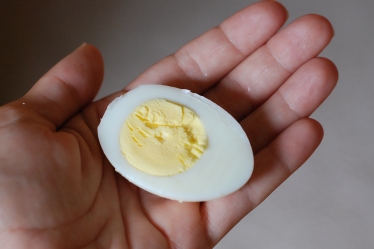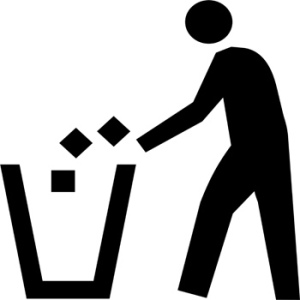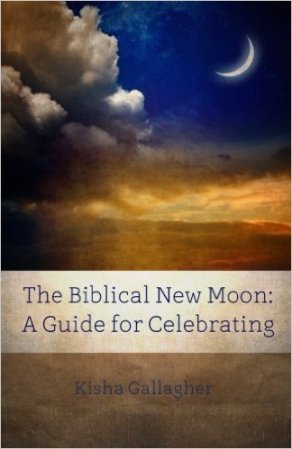 Not very long ago, my husband returned to work from the weekend to find a left over boiled egg in his desk. Since it was still in its shell, he reasoned that it was sealed and safe to eat. He then proceeded to peel and eat the egg. A few co-workers suggested that it was a bad idea, which made him doubt his choice. He then began texting me to ask my opinion on the matter. I agreed with his co-workers. We both googled the possible dangers of eating said egg. The prognosis didn’t look good. Would he succumb to food poisoning by eating a boiled egg that had sat at room temperature for a couple of days? We would have to wait and see.
Not very long ago, my husband returned to work from the weekend to find a left over boiled egg in his desk. Since it was still in its shell, he reasoned that it was sealed and safe to eat. He then proceeded to peel and eat the egg. A few co-workers suggested that it was a bad idea, which made him doubt his choice. He then began texting me to ask my opinion on the matter. I agreed with his co-workers. We both googled the possible dangers of eating said egg. The prognosis didn’t look good. Would he succumb to food poisoning by eating a boiled egg that had sat at room temperature for a couple of days? We would have to wait and see.
The good news is that my husband didn’t have any adverse side effects from eating the questionable egg. But this scenario made me think about how and why we make some of the choices we do. Years ago, I remember reading the statement: “We act out what we really believe”. (Sadly, I cannot recall where I read this.) That statement has stuck with me in a profound way throughout my journey in pursuing a Torah obedient lifestyle.
If we really, truly believe something, our actions will reflect said belief. My husband really believed it was perfectly fine to consume the egg, and so he ate it. Only after being confronted with another opinion did he question his choice and begin to research whether or not the choice was wise.
When I look back on my own life and walk with YHWH (the LORD), it becomes increasingly obvious that like my husband, I did many things (and ate many things) that I deemed perfectly acceptable until I was presented with a different opinion. Things that I thought stood on a firm foundation were proved to be nothing more than shifting sands. But even after reviewing the evidence for myself, I still had to make a choice. Would I continue in the way I had always walked because it felt safe and the majority also deemed it perfectly acceptable, or would I trust what God’s Word had clearly revealed to me?
When it comes to food safety, the rule is, “When in doubt, throw it out”. I wonder how many of us use this same logic in matters of faith and obedience. Those that are returning to Torah have lots of information to sift through as they learn “how” to obey God’s Word. Because of this natural process, it’s hard to find two people that “believe” or “act out” their walk in the exact same way. This isn’t a bad thing; it’s a human thing. It is simply the way the Creator made our minds process and work. Thus, when we demonize another being created in the image of God for their personal convictions and walk, we are in effect, demonizing the Creator.
 People
People
There are two areas that I believe we need to be especially careful of when using the “when in doubt, throw it out” rule. The first is in regard to people and the second is in regard to tradition. The Messiah didn’t just throw people out to the trash heaps because they were sinners, in disagreement with His theology, or were simply ignorant. He knew that discipleship didn’t mean to gather a bunch of “yes-men” around Himself. He knew that people weren’t perfect and didn’t always exercise perfect faith. He knew some would doubt and some would betray. Yet, He chose to love anyway. Those that followed Him could see the ups and downs, the trials and tribulations, the celebrations and prayers. They witnessed His joy, His anger, and even His tears. They watched the Son of Man live life, and it wasn’t all rainbows and unicorns.
When we let people in, it is not our “perfection” that draws them to walk as we walk. What causes others to want what we have is to see that we suffer from the same pain, trials, and tribulations as they do — yet we OVERCOME. They see us act differently when we are running late or get a flat tire. Instead of ranting, raving, and complaining, we respond differently. We look for the divine order in seeming chaos. We find peace instead of an inflamed nephesh (flesh). And if we fail and our nephesh takes over, they see us sincerely repent. This is discipleship.
Some of us are afraid of letting people see what really goes on behind closed doors. And others are afraid that those not on the same “spiritual level” as themselves will somehow taint their children. It seems instead of being steadfast believers; many of us are chronic doubters! Thus, nearly everything and everyone is “tossed out” in unholy fear. Let’s choose differently. The egg everyone tells you to toss out, may not be harmful at all!
Tradition
In regard to tradition and customs, we also need to be careful how we utilize the rule, “when in doubt, throw it out”. I know that I’ve had to go back and pick up some traditions that I had deemed “trash” in the past. Though humbling, it taught me a valuable lesson. Sometimes a tradition, custom, or way of observing a commandment may seem past its “use by date”. But before you throw it out, consider that it might be more akin to a red wine instead of a boiled egg. If you taste it before it has had time to mature, the flavor may be bitter on your tongue. Throwing it out would be a great mistake.
I’ll give you a small example from my life. When I first began observing Torah, I was hyper-cautious of anything written in Christian or Jewish commentaries. Blindly following church tradition had proven to rob me of many of the precious treasures (like God’s feast days and Shabbat) first given to us in God’s Law (Torah). Not properly understanding “adding and taking away” from the Word, I tossed anything out that I couldn’t immediately see in the written Word.
This included both Christian and Jewish liturgy and prayers. Later, I joined a group of believers that were utilizing the Jewish Siddur (prayer book). It was completely foreign to me and made me uncomfortable. I likened this type of prayer with Matthew 6:7 — until I really read the verse. (The context speaks of heathen Gentile prayers, not Jewish ones.) To make a long story short, the more exposure I had with the Siddur, the more I fell in love with the great care and diligence the many rabbis took in reverencing the King of the Universe. I began to understand how the prayer services mirrored the worship and sacrifice in the Tabernacle and Temple services. The Lord’s Prayer took on a deeper meaning for me as I was enlightened by the culture, language, and format of Jewish prayer. In a couple of words, the siddur has ENRICHED and BLESSED my prayer life!
If had went with my original inclination (to toss this “foreign” practice out), I would have missed out on this great treasure. And I would have lost valuable wisdom and insight. Above all, we are to fear HaShem (God), not man, circumstances, tradition, or the like.
If I could impart a little wisdom to those that are just coming to Torah (or even seasoned keepers), it would be this: Be careful how you weigh and judge others and even tradition. Not everything is pagan and evil. Don’t wall yourself into a prison. Be wise as a serpent, but gentle as a dove. Sometimes, the better choice is to shelf the wine bottle (foreign tradition) and let it age (you mature). After more time has passed, you may find that the bottle you almost tossed, brings you great joy, insight, and shalom.





A serious problem in the religious world, and perhaps in the secular world too, is prejudice. Now, prejudice can be positive (in relation to “us,” as well as negative, when we turn our gaze on others. Maybe we need to be a bit more like scientists, and examine and reflect before we pronounce judgement without seeking out evidence, cross-examing witnesses, testing and reflection. One case appears right before the other side brings their presentation.
LikeLiked by 1 person
So true Chaya!
With so many racially charged issues happening in our nation, I too, have been meditating and thinking about prejudice. Too often, I think we REACT instead of carefully “weighing”. Very rarely do we have all the facts before we make a “judgement”. There are so many things to consider. Many of which we haven’t the wisdom to contemplate to begin with. I believe there is much wisdom in letting some things simmer on the back burner as we gather more evidence. Acting rashly rarely yields good results.
K.
LikeLike
Yes, I meant prejudice in a generic sense, including far more than racial prejudice.
LikeLike
Yes, I thought so, but with so much going on (nationally) it seems to fit both. (: Obviously, my post was directed generically as well as to some Gentiles despairing Jewish thought, but for some reason, your response made me aware that it is “bigger” than that!
LikeLiked by 1 person
That was beautifully written, and lovingly given. Blessings and Shalom, Sarah
LikeLiked by 1 person
Thanks Sarah!
Blessings to you too!!!
K
LikeLiked by 1 person